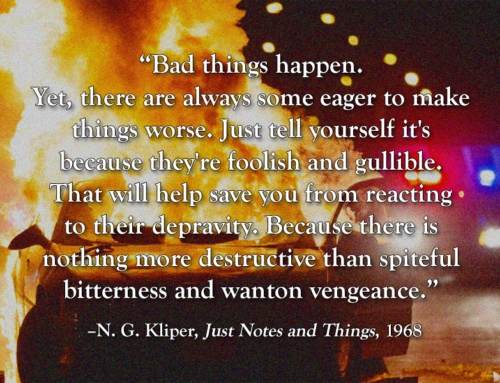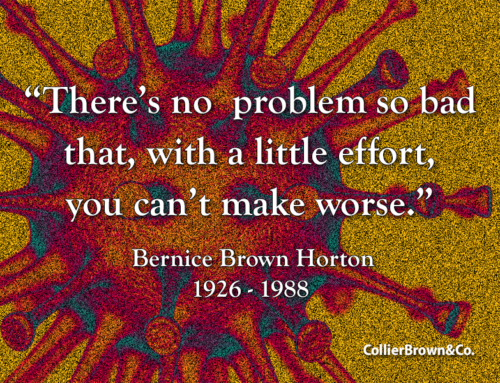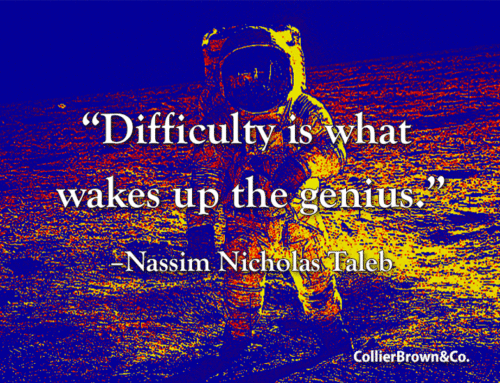V.U.C.A. world or not, we still have to make a difference. We still have to contribute. We still have to deliver value. And that means taking action and getting results. Yet, action unfolds and results often come about in stages. Clarity is often lacking, especially to the degree that allows us comfort and confidence. V.U.C.A. is more “both/and” and less “either/or.” Tomorrow is dotted with dilemmas (some of which appear to be mere problems-to-be-solved) and therefore requires the discipline of sensing and the ability to make sense (from what we have gathered). This foresight is valuable to the extent that it stimulates insight about what to do.
Think of “what to do” in light of making a difference, a contribution and delivering value rather than a task, job or assignment. What is our strategic intent?
Strategic intent is a variation on the military principle of managing by end state and intent. “The essence of the Marine style of giving direction is to avoid telling someone exactly how to do things when giving orders. Instead, Marine officers provide two clear statements: first, how they would like the situation to end up, what Marines refer to as ‘the end state’; and second, the broader goals that they would like to achieve through the entire unit’s actions, information that Marines call ‘the commander’s intent.’ End state and intent are critical concepts for the Marines because they leave the details of execution to the doer.”1
In a V.U.C.A. environment, where events tend to unfold quickly and unpredictably, a particular means to an end can become unfeasible, but if the end is well understood, other means can be engaged. Where to start?
- Purpose – What do you want to accomplish? How is this purpose related to the larger mission of the enterprise?
- Method or Task – What needs to be done?
- End state – What ends are we pursuing?
A particular enemy of strategic intent is a fixed mindset about how things should be done. For the most part, we are not solving puzzles via formulas, procedures and decision trees. Chance and unpredictability are more rightly the order of things. A fixed mindset is typically characterized by listening narrowly and generalizing broadly. This is exactly what we don’t need.
What we need is flexible firmness. There’s another one of those phrases that seems to have come from a bad kung fu movie. Think of it this way: flexing is like the freedom a musician has to improvise within the rhythmic structure of a particular piece of music. Even in jazz, the ultimate of music improv, there is a clear direction and a strong requirement for sensing (listening) for what others are doing within the same structure, moving along a common path. In the world of business, this translates to being guided by a firm understanding of our beliefs, values, responsibilities, as well as our intent, while maintaining the ability to flex in response to challenges we simply cannot predict. We need clear intent and sufficient autonomy to improvise during implementation.
Frank J. Barrett says in Yes to the Mess: Surprising Leadership Lessons from Jazz, we, like jazz musicians, need to, “interpret vague cues, face unstructured tasks, process incomplete knowledge and take away action. Musicians prepare themselves to be spontaneous. Managers and executives can do the same.”
Go make some good music.
In Other Words…
“Jazz, like leadership, combines the unpredictability of the future with the gifts of individuals.” – Max DuPree, Chairman Emeritus, Hermann Miller
“The most important thing I look for in a musician is whether he knows how to listen.” – Duke Ellington
“We are stubborn on vision. We are flexible on details….” ― Jeff Bezos
“The great presidents never forget the principles of the republic and seek to preserve and enhance them – in the long run– without undermining the needs of the moment. Bad presidents simply do what is expedient, heedless of principles. But the worst presidents are those who adhere to the principles regardless of what the fortunes of the moment demand.” ― George Friedman, The Next Decade: What the World Will Look Like
“The unexpected is our normal routine. Commander Riker” ― Star Trek: The Next Generation Episode Guide Team
In The Word…
“Do not keep talking so proudly or let your mouth speak such arrogance, for the Lord is a God who knows, and by him deeds are weighed.” – 1 Samuel 2:3
In Linked Words…
Your scary future, Part 7: how do you find comfort in an uncomfortable world?
Your scary future, Part 5; the necessity of a prepared mind
Your scary future, Part 4: the lady or the tiger?
Your scary future, Part 3: sense and sensibility
Your scary future, Part 2: what kind of problem do you have?
Your scary future, Part 1
1 CORPS Business: the 30 management principles of the U.S. Marines, David H. Freedman, HarperBusiness © 2000








Always excellent! Total knowledge of the subject!